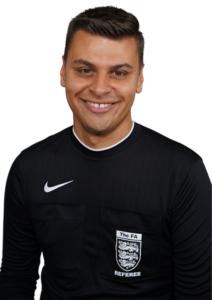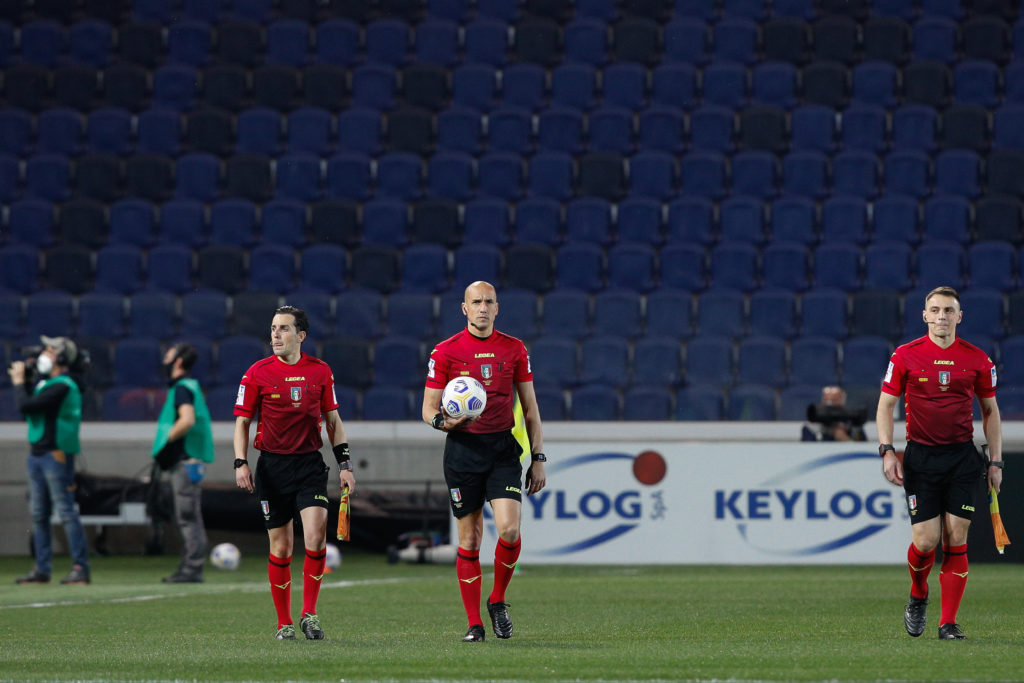When you’ve been practicing your mental toughness techniques, learning how to stay focused rather than being distracted by negative thoughts, and you’ve even gotten a handle on how stay positive when you or your team are not performing well out on the field of play. Great! You’re ahead of the curve and are setting yourself up for peak performance.
The nature of competitive sport, however, is that you’re not in this alone, and if you’re working in a team of referees, then the attitudes of your colleagues can be just as important as your own.
An official who knows how to stay focused and motivated, saying things like “let’s enjoy refereeing this game” or “that was a great decision” or “it’s all about teamwork, I’ve got your back” will surely keep your spirits lifted and your head in the game. With referees like that, you’re not only likely to perform at your best, you’ll gain a whole new appreciation for officiating and what it really means to be a part of something bigger than yourself.
If, on the other hand, you’re refereeing with colleagues who are negative, get frustrated easily, argue with the players and club officials, make unhelpful comments, don’t always show up, are cutting towards colleagues, or otherwise ruin the game for everybody else, then it’s going to be much harder for you to stay focused and do your best.
Rather than allowing this to drag you down, damage your confidence, and pull you away from officiating, which you love, try these suggestions instead:
Don’t Engage With The Negativity
It’s easy to get sucked into the black hole of negative thoughts, words, and actions, especially if there is more than one colleague on your refereeing team who’s causing trouble. But you are still in control of yourself. If you see yourself taking on negative characteristics, taking your officiating less seriously, or reacting from a place of fear rather than confidence, bring awareness to what’s happening and refocus your concentration on what matters to you: challenging yourself, improving your skills, having fun. Believe it or not you can still get the most out of your refereeing team when you don’t waste your brainpower on those negative people.
Talk to Your Coach or Referee Manager
It’s very likely that your coach or referee manager will be aware of how disruptive one or some of your colleagues might be. If you’ve got a good coach or manager, they’re probably doing their best to address the problem at the root cause, but what they may not realise is how it affects you personally. If the negative behaviour is affecting you, then don’t keep quiet about it, find a time to talk to your coach or referee manager privately and see if there’s any way they can address the problem more directly or improve the experience of working in an officiating team for you. Just remember to keep things in perspective and talk about how this negativity is affecting your confidence, enjoyment of refereeing, or performance during training or on matchday. Your coach or manager is your ally and can come up with a solution that lifts a huge weight off your shoulders.
Approach This as an Opportunity For Growth
You may not want to hear this, but experiencing this sort of adversity can actually make you a stronger match official. It’s a challenge that tests your concentration, your commitment, conflict resolution skills, problem-solving abilities, and might just motivate you to perform even better. When you’re thinking about this problem and how it affects you, take a moment to consider how it might benefit you as well. The answer may not be obvious and may not come right away, but asking this question can shift your mindset to still get something valuable from the experience.
Look Beyond The Outward Negativity
Often referees who are negative or disruptive are not doing it to hurt you, they’re just reacting to some other negative experience from their past and this is how it comes out. If you look beyond the outward negative expression and try acceptance, compassion, or even friendship then you might just find there to be much more beyond the surface, which changes everything. I’m not saying you should be their therapist, solve all their problems, or even that they’ll allow you to get close, but you can start by making a small effort to get to know them better and see where that takes you.
I hope this helps to adjust your approach to negative colleagues so that even if you can’t affect what they do, you can affect your response to remain positive.
What’s been your experience of dealing with negative colleagues?
At The Third Team I work individually and in collaboration with different professionals where I have developed workshops and 1-2-1 sessions associated with Resilience and Mental Toughness Development to help referees. The workshops and 1-2-1 sessions are interactive, where referees are encouraged to open up and share their experiences to help themselves and each other.
Feel free to contact me if you’d like to know more about my workshops or 1-2-1 sessions and how I could help you or your officials.
Best Wishes,

Nathan Sherratt
Referee Educator & Managing Director of The Third Team

Nathan Sherratt
Nathan Sherratt, Referee Educator, Resilience Trainer and Managing Director of The Third Team. A Mental Toughness Practitioner based in County Durham, North East England.

